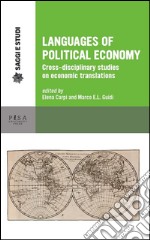Linguaggio Economico eBooks
eBooks con argomento Linguaggio Economico di Formato Pdf
Languages of Political Economy: Cross-disciplinary studies on economic translations. E-book. Formato PDF Elena Carpi - Pisa University Press Srl, 2014 -
Since its origins, the economic science has been a subject of public discussion and public enlightenment. It has spread across frontiers as the language of public opinion. The international circulation of economic ideas was fostered by translations of economic texts. These were performed both as individual initiatives and as part of more systematic publishing ventures such as specialised series of economic texts, digests, handbooks, etc. In order to fully understand the economic texts of the past it is very important to underline the linguistic aspects. Every economic text of the past has indeed been translated from the original language into other European languages in a specific way, using specific terms that reflect the historical and political context of the period. A linguistic analysis of the different translations made is therefore necessary to fully understand the history of economic thought. Equally important is to reconstruct the social, isntitutional and intellectual context of translations, in order to understand the reasons that inspired such ventures, the public at which they were aimed and how they were adapted to the new circumstances. The book collects a series of case studies conducted by historians of economics, linguists and historians of literature who have actively participated in the LLP/Erasmus Multilateral Project “EE-T. Economics e-Translations into and from European Languages, An Online Platform”, 2011-2013, coordinated by the University of Pisa. The originality of these contributions consists in the fact that scholars from different disciplines have worked jointly for two years, crossing the traditional boundaries of their respective fields of study and learning from each other how to appreciate the wealth of information that an economic translation is able to convey. With contributions from: Fabrizio Bientinesi(University of Pisa), Giulia Bianchi(University of Pisa), Elena Carpi University of Pisa), Marco Cini (University of Pisa), Carolina Flinz (niversity of Pisa), Alessandra Ghezzani(University of Pisa), Daniela Giaconi(University of Pisa), Antonella Leoncini Bartoli (La Sapienza University of Rome), Cristina Guccione( niversity of Palermo), Matteo Lefèvre(University of Rome Tor Vergata), Monica Lupetti (University of Pisa), Marco E.L. Guidi (University of Pisa).
